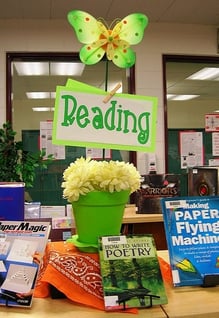School's out for the summer. Students and parents are yearning for the chance to kick back and relax. And what do schools do? Assign summer reading! Children balk and parents dread the ongoing battle to get their son or daughter to pick up a book. Many will say, “My child learns just as much from experiencing life outside of school by traveling, going to camp, or spending time with family. Why does it always have to be about reading and writing?”
And what do schools do? Assign summer reading! Children balk and parents dread the ongoing battle to get their son or daughter to pick up a book. Many will say, “My child learns just as much from experiencing life outside of school by traveling, going to camp, or spending time with family. Why does it always have to be about reading and writing?”
There is a method to the madness. Research shows that one of the most valid predictors of general intelligence is a command of vocabulary. And one of the best ways to develop a rich vocabulary is to read. Furthermore, what other activity can transport you to places real and imagined from the comforts of a hammock or beach chair?
So rather than fight it, here are 4 reading strategies that will help you and your child make the most out of summer reading:
1) Use questions to guide reading
Prior to actually reading a book, it is helpful for your child to have some study questions or queries to guide his/her reading. Besides helping to focus your son or daughter’s attention when reading, these questions also aide in comprehension and give purpose to the assignment. If the school does not provide these, it is easy to come up with these questions yourself. You can find synopses or summaries of many books on amazon, shmoop, or sparknotes. Depending on what you learn, you might ask your child, “Hmm, this book sounds interesting. I wonder how the main character resolves his/her problem?” or “The book sounds like it has a deeper meaning about what would be an ideal world. What do you think the author is trying to say?” This will help your child do active reading, and by showing your child how to best use available resources, think how clever and supportive he/she will think you are!
2) Read, think, summarize
This is another strategy to engage your child and encourage him/her to be an active reader. After reading every chapter, have your child write down a summary sentence to describe what happened in the chapter. Not only will this force your son or daughter to focus and digest what he/she has just read, but your child will end up with a valuable outline of the book. In September, when asked to write about the book, your child will have something to refer back to to jog his/her memory.
3) Make summer reading fun and interactive
With younger children, it sometimes helps to take turns reading aloud, alternating chapter by chapter. With older children, they may appreciate approaching the assignment as if they were in a book club. For example, your child might want to try buddying up with one or more classmates on a weekly basis to discuss what he/she read, or read other books by the same author or other books on the same subject matter and discussing the similarities and differences. With a little adult guidance and structure (and a refreshing summer snack), this could turn into a fun social event! Also, if you talk with your children about what you are reading and what you like/didn’t like about the book at the dinner table, that is a good way to model how to be a discriminating reader.
4) Make a plan to complete summer reading and stick to it
Take the number of pages that need to be read and divide them by the realistic number of days that your child has available for reading to come up with a target number of pages that your child should strive to read on most days. If you break up the reading into smaller chunks, the task may not seem quite so overwhelming and your son or daughter may be more likely to complete it.
So besides remembering the sun screen and the bug spray, don’t forget to try out these 4 active reading strategies to keep your child’s brain engaged for effective (and painless) summer reading!
Could your child benefit from academic coaching? Click below to find out more about how our academic coaches help students become more effective learners.
photo credit: Reading Helps Your Mind Bloom via photopin (license)


